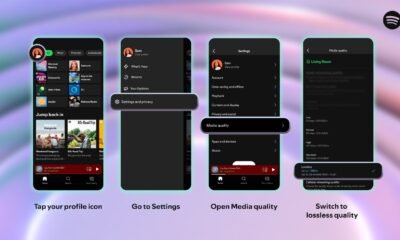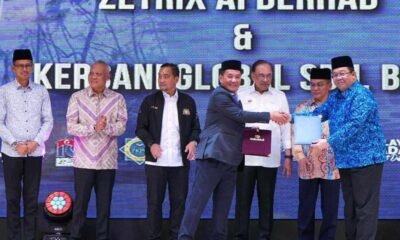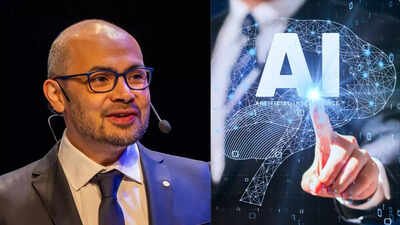AI Research
Nearly Half of Employees Trust AI More Than Their Co-Workers
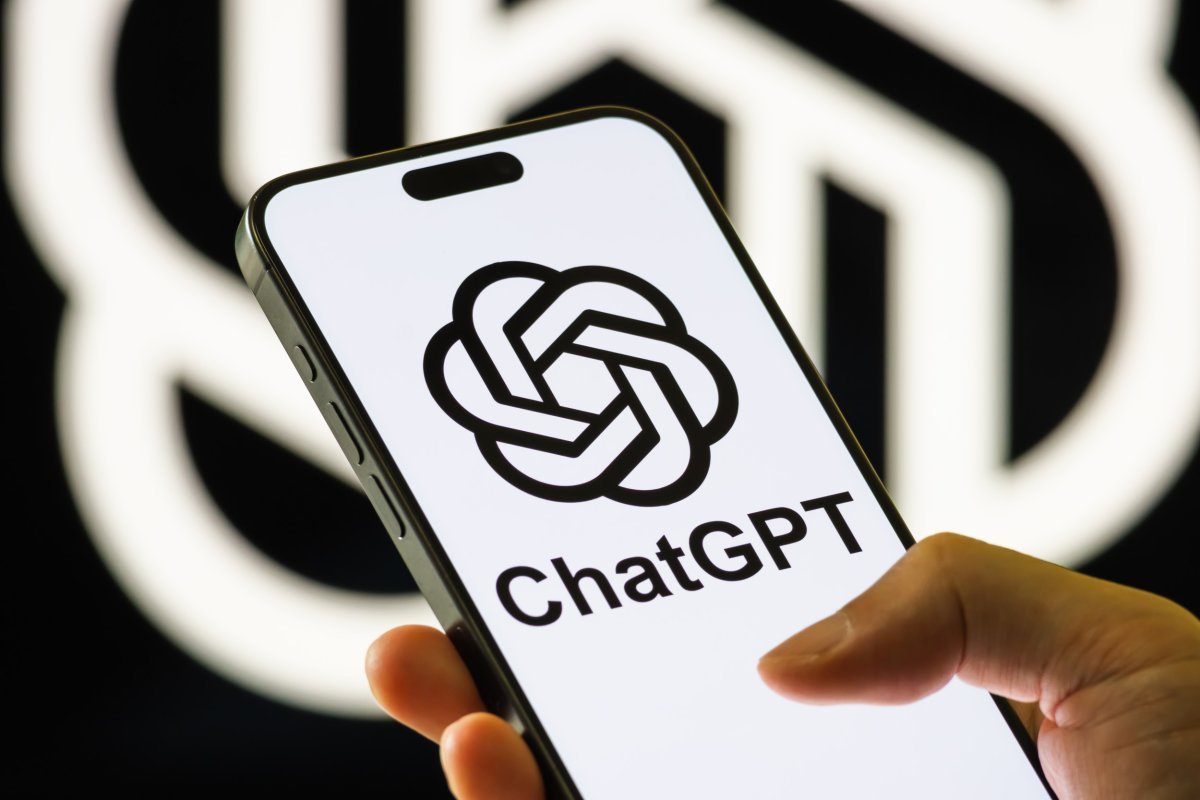
Nearly half of U.S. employees trust artificial intelligence more than their own co-workers, according to a new report from Calypso AI.
The findings show that AI is often seen as more trustworthy than humans, with 45 percent of workers saying they trust AI more.
Why It Matters
The widespread use of AI tools like ChatGPT, Gemini and Copilot has increased efficiency for many companies and industries, but it also exposes organizations to mounting cybersecurity, compliance and reputational risks.
A prior survey from security company Anagram found that nearly half of employees said they were using banned AI tools at work, and 58 percent admitted to pasting sensitive data into large language models, including client records and internal documents.
Cheng Xin/Getty Images
What To Know
The new Calypso AI survey of 1,000 office workers discovered that the use of AI is high at work, with 52 percent of employees saying they would use AI to make their job easier, even if it violated company policy.
This is especially true among executives, with 67 percent saying they’d use it even if against the rules.
“This stat says less about AI and more about people,” Mike Ford, CEO of Skydeo, told Newsweek. “Employees aren’t replacing trust in humans with machines, they’re responding to years of inconsistent leadership, unclear communication and internal politics. AI feels objective. It doesn’t play favorites, take credit or change its mind in the next meeting.”
There could be far-reaching implications for companies and how they define their AI policies, as 34 percent of those surveyed said they would quit their jobs if their employer banned AI.
“Leaders need to keep that trust by being transparent about how it works and making sure people still feel valued and connected,” David Brudenell, the executive director of Decidr, a global enterprise AI platform, told Newsweek. “The winning companies will pair that reliability with human judgment and creativity, so employees trust the whole system, not just the software.”
To date, 28 percent admitted to using AI to access sensitive data, while 28 percent also said they’ve submitted proprietary company information so AI could complete a task.
What People Are Saying
Donnchadh Casey, CEO of CalypsoAI, in a statement: “These numbers should be a wake-up call. We’re seeing executives racing to implement AI without fully understanding the risks, frontline employees using it unsupervised, and even trusted security professionals breaking their own rules. We know inappropriate use of AI can be catastrophic for enterprises, and this isn’t a future threat—it’s already happening inside organizations today.”
HR consultant Bryan Driscoll told Newsweek: “It’s less about blind faith in a machine and more about deep skepticism of people. Employees see AI as impartial, at least compared to colleagues who can bring politics, bias or grudges into decisions. But that trust often comes from assuming the tech is somehow above human flaws. It’s not. If the data it’s trained on is biased, the output will be too.”
David Brudenell, the executive director of Decidr, a global enterprise AI platform, told Newsweek: “AI earns trust because it’s consistent, fast, and free from office politics, which are qualities humans don’t always deliver. The future isn’t AI replacing people, it’s AI becoming the most reliable teammate in the room.”
What Happens Next
The shift toward trusting AI over co-workers shows that the employees are craving consistency and transparency, Driscoll said.
“If employers don’t address the root problem—eroding trust between people—AI will fill that gap, for better or worse. That could hardwire algorithmic decision-making into core operations before we’ve reckoned with its risks,” Driscoll said.
AI Research
UTM Celebrates Malaysia’s Youngest AI Researcher Recognised at IEEE AI-SI 2025 – UTM NewsHub
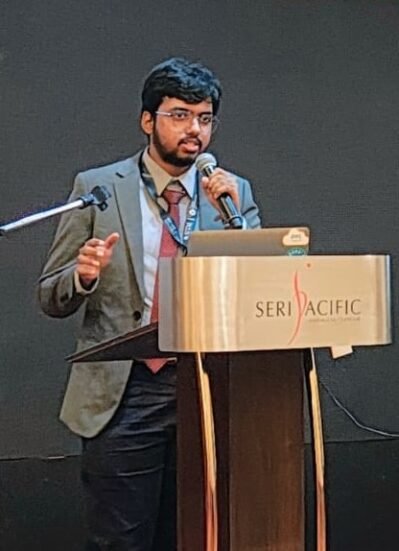
KUALA LUMPUR, 28 August 2025 – Universiti Teknologi Malaysia (UTM) proudly hosted the Institute of Electrical and Electronics Engineers (IEEE) International Conference on Artificial Intelligence for Sustainable Innovation (AI-SI) 2025, themed “Empowering Innovation for a Sustainable Future.” The conference gathered global experts, academics, and industry leaders to explore how Artificial Intelligence (AI) can address sustainability challenges. Among its highlights was the remarkable achievement of 17-year-old Malaysian researcher, Charanarravindaa Suriess, who was celebrated as the youngest presenter and awarded Best Presenter for his groundbreaking paper on adversarial robustness in neural networks. His recognition reflected not only individual brilliance but also Malaysia’s growing strength in the global AI research landscape.
Charanarravindaa’s presentation, titled “Two-Phase Evolutionary Framework for Adversarial Robustness in Neural Networks,” introduced an innovative framework designed to improve AI systems’ ability to defend against adversarial attacks. His contribution addressed one of the most pressing challenges in AI, ensuring resilience and trustworthiness of machine learning models in real-world applications. Born in Johor Bahru, his journey into science and computing began early; by primary school, he was already troubleshooting computers and experimenting with small websites. At just 15 years old, he graduated early, motivated by a passion for deeper challenges. Participation in international hackathons, including DeepLearning Week at Nanyang Technological University (NTU) Singapore, strengthened his resolve and provided the encouragement that led to his first academic paper, now internationally recognised at IEEE AI-SI 2025.
Beyond academia, Charanarravindaa has also demonstrated entrepreneurial spirit by founding Cortexa, a startup dedicated to advancing AI robustness, architectures, and applied AI for scientific discovery. His long-term vision is to integrate artificial intelligence with quantum computing and theoretical physics to expand the boundaries of knowledge. This ambition is a testament to the potential of Malaysia’s youth in contributing to frontier technologies. His recognition at IEEE AI-SI 2025 reflects IEEE’s mission of advancing technology for humanity, where innovation is seen as a universal endeavour not limited by age. By honouring a young researcher, IEEE underscored its commitment to empowering future generations of scientists and innovators to shape technology for global good.

During the conference, the Faculty of Artificial Intelligence (FAI), UTM, represented by Associate Professor Dr. Noor Azurati Ahmad, extended an invitation to Charanarravindaa to explore possible research collaborations. This initiative aligns with FAI’s vision to be a leader in AI education, research, and innovation, with a particular focus on trustworthy, robust, and sustainable AI. Early discussions centred on aligning his research interests with UTM’s expertise in advanced architectures and digital sustainability. Such collaboration exemplifies how institutions and young talent can come together to accelerate innovation, while also strengthening Malaysia’s position as an emerging hub for AI research and talent cultivation.
At the national level, this achievement resonates strongly with the Malaysia National Artificial Intelligence Roadmap (2021–2025), which identifies talent development as a central pillar in building an AI-ready nation. Prime Minister Datuk Seri Anwar Ibrahim has repeatedly highlighted the urgency of nurturing local talent to enhance competitiveness and leadership in the global digital economy. Charanarravindaa’s success demonstrates tangible progress in this direction, showcasing how Malaysia can produce young innovators capable of contributing to both national aspirations and international scientific advancement. Through platforms such as IEEE AI-SI 2025, UTM reaffirms its role as a catalyst for excellence in AI research and talent development, embodying its mission to prepare the next generation of scholars and innovators who will drive sustainable futures.
AI Research
Databricks at a crossroads: Can its AI strategy prevail without Naveen Rao?

“Databricks is in a tricky spot with Naveen Rao stepping back. He was not just a figurehead, but deeply involved in shaping their AI vision, particularly after MosaicML,” said Robert Kramer, principal analyst at Moor Insights & Strategy.
“Rao’s absence may slow the pace of new innovation slightly, at least until leadership stabilizes. Internal teams can keep projects on track, but vision-driven leaps, like identifying the ‘next MosaicML’, may be harder without someone like Rao at the helm,” Kramer added.
Rao became a part of Databricks in 2023 after the data lakehouse provider acquired MosaicML, a company Rao co-founded, for $1.3 billion. During his tenure, Rao was instrumental in leading research for many Databricks products, including Dolly, DBRX, and Agent Bricks.
AI Research
NFL player props, odds: Week 2, 2025 NFL picks, SportsLine Machine Learning Model AI predictions, SGP

The Under went 12-4 in Week 1, indicating that not only were there fewer points scored than expected, but there were also fewer yards gained. Backing the Under with NFL prop bets was likely profitable for the opening slate of games, but will that maintain with Week 2 NFL props? Interestingly though, four of the five highest-scoring games last week were the primetime games, so if that holds, then the Overs for this week’s night games could be attractive with Week 2 NFL player props.
There’s a Monday Night Football doubleheader featuring star pass catchers like Nico Collins, Mike Evans and Brock Bowers. The games also feature promising rookies such as Ashton Jeanty, Omarion Hampton and Emeka Egbuka. Prop lines are usually all over the place early in the season as sportsbooks attempt to establish a player’s potential, and you could take advantage of this with the right NFL picks. If you are looking for NFL prop bets or NFL parlays for Week 2, SportsLine has you covered with the top Week 2 player props from its Machine Learning Model AI.
Built using cutting-edge artificial intelligence and machine learning techniques by SportsLine’s Data Science team, AI Predictions and AI Ratings are generated for each player prop.
Now, with the Week 2 NFL schedule quickly approaching, SportsLine’s Machine Learning Model AI has identified the top NFL props from the biggest Week 2 games.
Week 2 NFL props for Sunday’s main slate
After analyzing the NFL props from Sunday’s main slate and examining the dozens of NFL player prop markets, the SportsLine’s Machine Learning Model AI says Lions receiver Amon-Ra St. Brown goes Over 63.5 receiving yards (-114) versus the Bears at 1 p.m. ET. Detroit will host this contest, which is notable as St. Brown has averaged 114 receiving yards over his last six home games. He had at least 70 receiving yards in both matchups versus the Bears a year ago.
Chicago allowed 12 receivers to go Over 63.5 receiving yards last season as the Bears’ pass defense is adept at keeping opponents out of the endzone but not as good at preventing yardage. Chicago allowed the highest yards per attempt and second-highest yards per completion in 2024. While St. Brown had just 45 yards in the opener, the last time he was held under 50 receiving yards, he then had 193 yards the following week. The SportsLine Machine Learning Model projects 82.5 yards for St. Brown in a 4.5-star pick. See more Week 2 NFL props here.
Week 2 NFL props for Vikings vs. Falcons on Sunday Night Football
After analyzing Falcons vs. Vikings props and examining the dozens of NFL player prop markets, the SportsLine’s Machine Learning Model AI says Falcons running back Bijan Robinson goes Over 65.5 rushing yards (-114). Robinson ran for 92 yards and a touchdown in Week 14 of last season versus Minnesota, despite the Vikings having the league’s No. 2 run defense a year ago. The SportsLine Machine Learning Model projects Robinson to have 81.8 yards on average in a 4.5-star prop pick. See more NFL props for Vikings vs. Falcons here.
You can make NFL prop bets on Robinson, Justin Jefferson and others with the Underdog Fantasy promo code CBSSPORTS2. Pick at Underdog Fantasy and get $50 in bonus funds after making a $5 wager:
Week 2 NFL props for Buccaneers vs. Texans on Monday Night Football
After analyzing Texans vs. Buccaneers props and examining the dozens of NFL player prop markets, the SportsLine’s Machine Learning Model AI says Bucs quarterback Baker Mayfield goes Under 235.5 passing yards (-114). While Houston has questions regarding its offense, there’s little worry about the team’s pass defense. In 2024, Houston had the second-most interceptions, the fourth-most sacks and allowed the fourth-worst passer rating. Since the start of last year, and including the playoffs, the Texans have held opposing QBs under 235.5 yards in 13 of 20 games. The SportsLine Machine Learning Model forecasts Mayfield to finish with just 200.1 passing yards, making the Under a 4-star NFL prop. See more NFL props for Buccaneers vs. Texans here.
You can also use the latest FanDuel promo code to get $300 in bonus bets instantly:
Week 2 NFL props for Chargers vs. Raiders on Monday Night Football
After analyzing Raiders vs. Chargers props and examining the dozens of NFL player prop markets, the SportsLine’s Machine Learning Model AI says Chargers quarterback Justin Herbert goes Under 254.5 passing yards (-114). The Raiders’ defense was underrated in preventing big passing plays a year ago as it ranked third in the NFL in average depth of target allowed. It forced QBs to dink and dunk their way down the field, which doesn’t lead to big passing yardages, and L.A. generally prefers to not throw the ball anyway. Just four teams attempted fewer passes last season than the Chargers, and with L.A. running for 156.5 yards versus Vegas last season, Herbert shouldn’t be overly active on Monday night. He’s forecasted to have 221.1 passing yards in a 4.5-star NFL prop bet. See more NFL props for Chargers vs. Raiders here.
How to make Week 2 NFL prop picks
SportsLine’s Machine Learning Model has identified another star who sails past his total and has dozens of NFL props rated 4 stars or better. You need to see the Machine Learning Model analysis before making any Week 2 NFL prop bets.
Which NFL prop picks should you target for Week 2, and which quarterback has multiple 5-star rated picks? Visit SportsLine to see the latest NFL player props from SportsLine’s Machine Learning Model that uses cutting-edge artificial intelligence to make its projections.
-

 Business2 weeks ago
Business2 weeks agoThe Guardian view on Trump and the Fed: independence is no substitute for accountability | Editorial
-
Tools & Platforms1 month ago
Building Trust in Military AI Starts with Opening the Black Box – War on the Rocks
-

 Ethics & Policy2 months ago
Ethics & Policy2 months agoSDAIA Supports Saudi Arabia’s Leadership in Shaping Global AI Ethics, Policy, and Research – وكالة الأنباء السعودية
-

 Events & Conferences4 months ago
Events & Conferences4 months agoJourney to 1000 models: Scaling Instagram’s recommendation system
-

 Jobs & Careers2 months ago
Jobs & Careers2 months agoMumbai-based Perplexity Alternative Has 60k+ Users Without Funding
-

 Podcasts & Talks2 months ago
Podcasts & Talks2 months agoHappy 4th of July! 🎆 Made with Veo 3 in Gemini
-

 Education2 months ago
Education2 months agoVEX Robotics launches AI-powered classroom robotics system
-

 Education2 months ago
Education2 months agoMacron says UK and France have duty to tackle illegal migration ‘with humanity, solidarity and firmness’ – UK politics live | Politics
-

 Podcasts & Talks2 months ago
Podcasts & Talks2 months agoOpenAI 🤝 @teamganassi
-

 Funding & Business2 months ago
Funding & Business2 months agoKayak and Expedia race to build AI travel agents that turn social posts into itineraries




